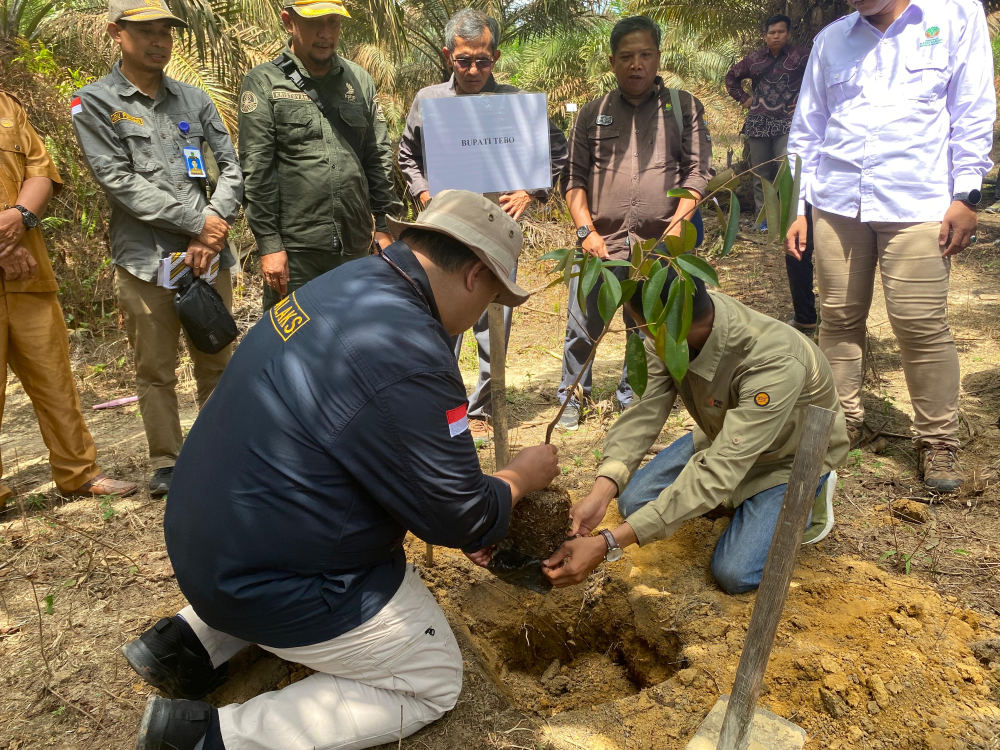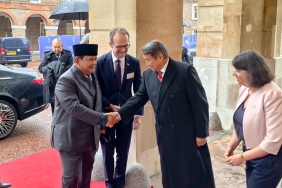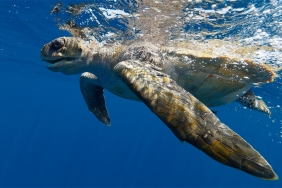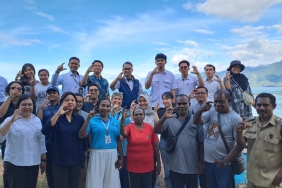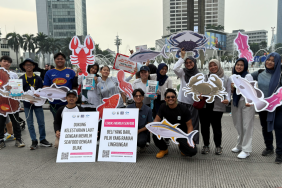IMPLEMENTATION OF THE REMEDIATION PERIOD, PROMOTING SUSTAINABLE PALM OIL GOVERNANCE AND ECOSYSTEM RESTORATION IN TEBO DISTRICT, JAMBI PROVINCE
Tebo, May 7, 2025 - WWF-Indonesia, in collaboration with the Local Government of Jambi Province and Tebo Regency, Pundi Sumatra, Gadjah Mada University, Jambi University, Brawijaya University, and Palangka Raya University, organized the "Sekolah Jangka Benah" activity. This activity took place from May 4-6, 202,5, in Tebo Regency, Jambi Province.
The Jangka Benah School is part of the Remediation Period Strategy (SJB), one of the strategic approaches being developed by Universitas Gadjah Mada with the support of WWF-Indonesia as an accelerator. This approach is an effort to support the Government of Indonesia and various stakeholders to continue to push for solutions to the problem of the persistence of monoculture palm oil in forest areas.
This strategy is implemented through area management methods to restore forest ecosystems while considering social and economic aspects of the community. Irfan Bakhtiar, Director of Climate and Market Transformation at WWF Indonesia, said "Jangka Benah is a potential solution to overcome the problem of oil palm proliferation in forest areas through an agroforestry approach. By integrating oil palm with other commodities, this scheme not only helps restore the ecological function of degraded forest areas, but also maintains the productivity aspect". Irfan continued, "We see that the community is starting to feel the real benefits of this program for their daily needs".
Participants who attended the school came from various related parties, ranging from local-level decision makers, academics, non-governmental organizations, to farmers who are members of social forestry groups. "This strategy is one of the three main pillars in resolving tenurial issues of oil palm plantations in forest areas along with area arrangement for land tenure of up to 5 hectares, as well as the imposition of administrative sanctions for land tenure exceeding 5 hectares," said Dr. Ir. Hero Marhaento, S.Hut., M.Si., Lecturer at the Faculty of Forestry, Universitas Gadjah Mada (UGM).
"The Tebo Regency Government fully supports Jangka Benah as a strategic and innovative step to resolve the issue of palm oil in forest areas in a sustainable manner because it is in line with the vision and mission of Tebo Regency, which will later become an important indicator in the preparation of the RPJMD as an implementation of sustainable development. This program not only provides tangible benefits to the community from an economic and environmental perspective, but also has great potential to become an example of good practice that can be replicated by other regions in Indonesia in an effort to maintain a balance between land productivity and forest conservation. Therefore, active collaboration with the Jambi Provincial Government and Tebo Regency will greatly influence the success of a program that has great potential to support a sustainable economy." Said Joko Ardiawan, S.P., Assistant for Economy and Development of the Regional Secretariat of Tebo Regency.
The Benah Term Strategy includes two main stages. The first stage is to convert monoculture oil palm plantations into agroforestry systems through precision agroforestry techniques, which tailor plant species to the function of the forest of origin (Production Forest, Protection Forest, or Conservation Forest). The second stage is to enrich the vegetation structure towards a multi-layered condition like the natural forest structure so that its ecological function can be restored. "We are currently running the SJB program in two social forestry groups, namely Bungo Pandan HTR Cooperative and Setia Jaya Mandiri HTR Cooperative, with a target of developing a demonstration plot of 50 hectares which will be intensively assisted," said Dewi Yunita Widiarti, CEO of Pundi Sumatra
The program is funded by the European Union (EU), through the development of demonstration pilots in Jambi and Central Kalimantan provinces.
About the ECS Project:
WWF-Indonesia and AURIGA supported by the European Union are collaborating on the project "Supporting Civil Society Contributions to Prosperous, Equitable and Sustainable Development in Energy Transition and Sustainable Land Management" (ECS). The project aims to promote and strengthen civil society organizations at the national and sub-national levels to play an important role in the policy formulation process of energy transition and sustainable land management, and its implementation at the field level. This publication is funded by the European Union. Its contents are the sole responsibility of WWF-Indonesia and AURIGA and do not necessarily reflect the views of the European Union.
For further information, please contact:
klestiarsi@wwf.id / 0852-1816-1683

